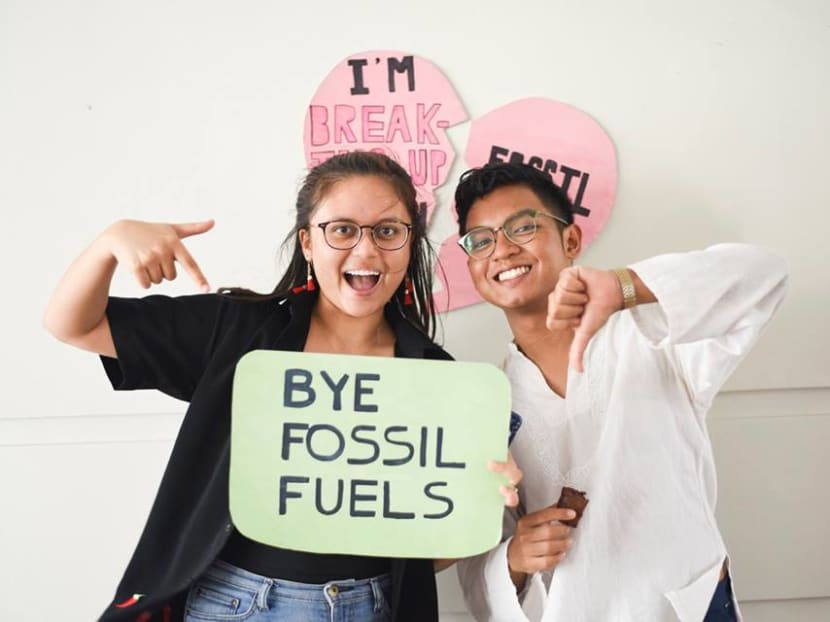More S’poreans aware of climate change but not doing enough to slow crisis, say activists
SINGAPORE — Some activists believe that while more Singaporeans are aware of climate change, their level of understanding is still superficial, and that habits are not yet changing enough to make a significant difference.

Students at Yale-NUS College are among activists in Singapore pushing hard to raise awareness of climate change, and the need to take drastic action.
SINGAPORE — Some activists believe that while more Singaporeans are aware of climate change, their level of understanding is still superficial, and that habits are not yet changing enough to make a significant difference.
Corporations, government bodies and the wider community are mostly underestimating the seriousness of the issue, and more needs to be done urgently to tackle the crisis, they add.
Mr Sivasothi N, 52, a senior lecturer at the Department of Biological Sciences at the National University of Singapore (NUS) is among those who have been struck by the change in mindsets here — even if it’s at a modest level.
He told TODAY on Friday (Aug 23) that he was surprised to hear that the administrative officers at NUS were receptive when a group of student activists asked for more plant-based options to be available in the canteens university-wide. Growing plant-based food produces far less carbon emissions than meat products, for example.
“This is so crazy. It’s not something that was happening 10 years ago, it’s no longer a strange idea. The modern individuals who care about this now have support from their peers and even the authorities,” he said.
Mr Sivasothi said that the change he has observed in the mindsets of Singaporeans over the last decade has been “phenomenal”. Previously, such demands would have never been entertained by the authorities, he added.
MORE BECOMING MINDFUL OF CLIMATE CHANGE
Some middle-aged Singaporeans are getting the message from the young.
Madam Chan Yen Ling, 51, has started to make the conscious choice to refuse plastic bags from the cashier since she attended her daughter’s graduation in Edinburgh, Scotland in July.
Her daughter, 22, who studied Ecological and Environmental Science at the University of Edinburgh, makes a habit of taking grocery bags to the supermarket.
For Mdm Chan, a key moment in her change of habit was seeing an image of a whale which had died after ingesting too many plastic bags in the ocean.
“I saw that whales have died because they are too full of plastic. Such a terrible way to die. And we lose such a magnificent animal all because of plastic bags. These kinds of animal stories will affect me a lot so I will really try to use less plastic bags, or use it many times to try and maximise it,” she said.
An environmental activist Ms Maria Tan, 24, has also observed a mindset shift over the years where environmental issues are now spoken about more frequently.
“Climate change has gotten a lot more airtime in recent years, especially in 2018. I think it is also because there has been more media coverage on environmental issues over the past few years,” said the co-founder of Back to Ground Zero, a local environmental group.
Earth Society vice-president, Mr Low Chip Khoon, 46, has noted a rise in the number of companies which have approached the group to conduct talks about climate change.
Once the message of climate change is made clear to the attendees, they are usually keen on learning how they can do their part to mitigate the effects of climate change, he added.
BUT UNDERSTANDING IS STILL SUPERFICIAL
Ms Tan Beng Chiak, 57, who is a member of the Nature Society Singapore and a board member of the Jane Goodall Institute, said that while Singaporeans have become more aware of climate change, most are still largely unaware of the consequences of their actions on the environment.
“Even though they know it is a concern, they will still prioritise their own needs, such as turning the air-conditioning on or running the tap,” she said.
“It is still unlikely that Singaporeans would go out of their way to ensure that their actions do not have any impact on the environment,” she added.
“People are also not concerned about finding out where their money is going, whether their banks are investing in ventures that ruin the environment,” she said.
Agreeing, Ms Lee Guat Keow, 51, said that younger people still place greater importance on efficiency and convenience over thinking carefully about their consumption habits.
Ms Lee, an art therapist and school counsellor who is passionate about the environment, said she observes that the younger generation — including her own children — still choose their own comfort and desires over being more prudent about their use of resources.
“They consume to meet their needs, buying a lot of clothes or throwing things away mindlessly when they are in a rush. They take it for granted that someone will take care of it so they do not consider the repercussions of their actions. My kids, their clothes will just pile up and pile up,” she said.
Mr Subaraj Rajathurai, 56, director of Strix Wildlife Consultancy, a local natural history group, emphasised that the severity of climate change needs to be fully understood as current estimates may not accurately reflect the reality of the climate crisis.
“We have to look at the reality in the long term. Based on (Prime Minister Lee Hsien Loong’s National Day Rally speech) the other day, we are slowing down our emissions by 2030. But if you calculate it, our emissions will still be higher than what they are today. We have to look harder at what significant changes can be made,” he said.
SEVERITY OF ISSUE MUST BE ACKNOWLEDGED
Nominated Member of Parliament Anthea Ong warns that by not taking climate change seriously, the Government and society at large may overlook the consequences it may have on social structures in Singapore.
Ms Ong told TODAY on Thursday (Aug 22) that young people have spoken to her about their fears of having children, given the alarming picture that reports on climate change paint.
“Many young people have recently lamented to me that they do not think they will have kids because of their dystopian view of the future with climate change, and therefore, they see no need to get married if that’s the case,” she said.
These are anxieties that are often not taken into account when we discuss how to tackle climate change, but they should not be neglected, she added.
“We should be taking note of this. The older generation may not realise the kind of impact that climate change has on the younger generation in terms of making big life decisions. And this is something that will possibly continue to grow in the future,” she said.
GOVERNMENTS, CORPORATIONS TO TAKE THE LEAD
Ms Tan said that ultimately, public awareness is not enough to move the needle on slowing down the rate at which climate change is rearing its ugly head.
“At the end of the day, we need a combination of political, commercial and industrial will as well as public (awareness) to make a change. I do think that the people who need to change (their mindsets) the most are the industries because their actions will be more impactful than the layman,” she said.
She added that policies should not only be focused on adapting to the problem. More attention needs to be directed to ramping up awareness and mitigation efforts.
Making reference to PM Lee’s speech, Ms Tan said that as an educator, she was upset that Mr Lee did not speak more about how to raise understanding of climate change.
“If we don’t teach it in schools, who is going to do the understanding of climate change and how it will affect Singapore? (The Government) cannot tell us we are not doing enough while not providing Singaporeans with the information on how they can do their part,” she added.
Mr Aidan Mock, 23, an undergraduate at Yale-NUS College and one of the co-founders of Fossil Free Yale-NUS, said that activism must go beyond straws and plastic bags to really make a difference. Greater public awareness of the impact that industries have on emissions can help to put pressure on them to halt the burning of fossil fuels.
“Bigger institutional action such as divesting from fossil fuels or shutting down fossil fuel plants have a huge impact and are attractive areas for individuals to spend (their) time and energy advocating for,” he said.
He warns that leaving governments to proceed with “business as usual” will not do much to slow down the current trajectory of climate shifts and “greater political action” is needed to really get the ball moving in the right direction.











